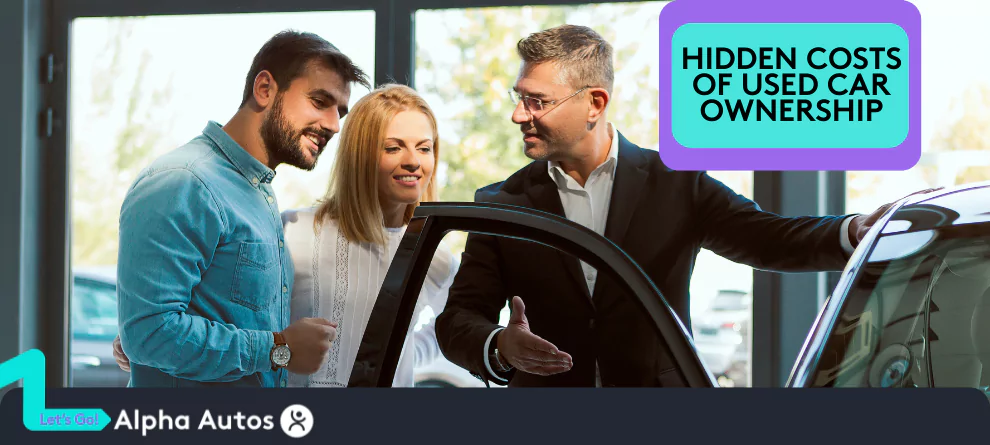

Hidden Costs of Used Car Ownership (and How to Avoid Them)
The lure of a used car is undeniable – a seemingly lower price tag, a chance to get a decent vehicle without breaking the bank. However, many Aussies soon discover that the initial savings can be quickly eaten away by unexpected expenses. Used cars often come with hidden costs that can turn a seemingly smart purchase into a financial headache. This article aims to equip you with the knowledge to anticipate and avoid these hidden costs, ensuring your used car purchase remains a wise investment, not a money pit.
Unexpected Repairs: The Mechanical Gamble
- Older Vehicle Issues:
- Older vehicles, especially those with high mileage or a patchy service history, are more prone to mechanical problems.
- The harsh Australian climate and diverse driving conditions can accelerate wear and tear, leading to unexpected breakdowns.
- Common Repair Costs:
- Be prepared for potential repairs like transmission issues (often $2,000 – $5,000+), brake replacements ($500 – $1,500+), suspension problems ($800 – $2,000+), and air conditioning repairs (a must in Aussie summers, $500 – $2,000+).
- These are just examples, and costs can vary significantly depending on the vehicle’s make, model, and the mechanic’s rates.
- Pre-Purchase Inspection: Your Best Defense:
- A thorough pre-purchase inspection by a trusted mechanic is essential. Don’t rely solely on the seller’s word.
- The inspection should cover the engine, transmission, brakes, suspension, electrical system, and overall condition of the vehicle.
- Learn how to interpret the inspection report and don’t be afraid to ask questions.
- Warranty Considerations: Read the Fine Print!
- Used car warranties can provide peace of mind, but they often come with limitations.
- Understand the warranty terms, including what’s covered, the duration, and any exclusions.
- Be aware that some warranties may only cover major components, while others may have mileage or age restrictions.
Insurance Premiums: The Age and History Factor
- Age of the Vehicle:
- Older vehicles, especially those deemed high-risk or difficult to repair, can sometimes attract higher insurance premiums.
- Insurers factor in the increased likelihood of breakdowns and the potential for more expensive repairs when calculating premiums.
- Vehicle History:
- A car’s history, including any previous accidents, damage, or theft claims, significantly affects insurance rates.
- Even minor incidents can lead to higher premiums, as insurers view these vehicles as higher risk.
- Comparing Quotes:
- It’s crucial to get multiple insurance quotes before purchasing a used car. Don’t settle for the first offer you receive.
- Utilize online comparison tools and consider consulting independent insurance agents to find the best coverage at the most competitive price.
- Coverage Options:
- Understand the different coverage options available, such as comprehensive, third-party property damage, and third-party fire and theft.
- Choose the right level of coverage based on your budget and the vehicle’s value. Remember, cheaper is not always better.
Maintenance and Servicing: The Ongoing Expense
- Regular Maintenance:
- Regular maintenance, including oil changes, tire rotations, fluid checks, and brake inspections, is essential for keeping your used car running smoothly and preventing costly breakdowns.
- Budget for annual maintenance costs, which can range from a few hundred to a few thousand dollars, depending on the vehicle’s age and condition.
- Parts Availability:
- Older or less common models may have higher costs or difficulty finding replacement parts.
- Imported vehicles, or those with rare parts, can be significantly more expensive to maintain.
- DIY vs. Professional:
- DIY maintenance can save money, but it requires mechanical knowledge and the right tools.
- Professional servicing by a reliable mechanic ensures quality workmanship and can prevent further damage.
- Choose a mechanic you trust, and don’t be afraid to ask for recommendations.
Fuel Efficiency: The Mileage Matters
- Older Engine Technology:
- Older engines often lack the fuel-efficient technologies found in newer models, such as direct injection and variable valve timing.
- This can result in significantly higher fuel consumption, especially in city driving.
- Fuel Costs: The Long-Term Drain:
- Fuel costs can add up significantly over time, particularly with poor fuel economy.
- For example, a car consuming 12L/100km will cost considerably more to fuel than one consuming 8L/100km, especially with Australia’s fluctuating fuel prices.
- Vehicle Size and Type: Bigger is Thirstier:
- Larger vehicles, such as SUVs and 4x4s, generally consume more fuel than smaller cars and sedans.
- Consider your driving needs and choose a vehicle with reasonable fuel efficiency.
- Driving Habits: Drive Smart, Save Fuel:
- Aggressive driving habits, such as rapid acceleration and hard braking, significantly increase fuel consumption.
- Smooth, consistent driving can improve fuel economy.
Registration and Taxes: The State and Local Fees
- Registration Fees:
- Registration fees in Australia vary significantly based on the vehicle’s age, type, and your state or territory.
- Older vehicles or those with larger engines may attract higher registration fees.
- Sales Tax (Stamp Duty):
- Depending on your state, you may be required to pay stamp duty on the purchase of a used car.
- This tax is typically calculated as a percentage of the vehicle’s purchase price.
- Other Fees:
- Be aware of potential additional fees, such as emissions testing (where applicable) and title transfer fees.
- These fees can add to the overall cost of your used car purchase.
Depreciation: The Value Drop
- Rate of Depreciation:
- While used cars depreciate at a slower rate than new cars, they still lose value over time.
- The rate of depreciation varies depending on the vehicle’s make, model, age, and condition.
- Impact on Resale: Selling Your Ride for Less:
- Depreciation directly affects the car’s resale value.
- A vehicle with high depreciation will fetch a lower price when you decide to sell or trade it in.
- Choosing Vehicles with Good Resale Value: Smart Investment:
- Opt for vehicles known for retaining their value, such as popular models with a strong reputation for reliability.
- Research resale values before purchasing a used car to minimise potential losses.
How to Avoid These Hidden Costs
- Thorough Research:
- Before purchasing a used car, conduct thorough research on its history, reliability, and potential maintenance costs.
- Utilize online resources to check vehicle history reports and read reviews from other owners.
- Australian specific research is key. Knowing common issues with certain models in Australian conditions will save you money.
- Pre-Purchase Inspection:
- A pre-purchase inspection by a trusted, independent mechanic is non-negotiable.
- This inspection can uncover hidden mechanical issues and provide valuable insights into the vehicle’s condition.
- Don’t be afraid to walk away if the inspection reveals significant problems.
- Negotiate Wisely:
- Negotiate the price based on the vehicle’s condition and any potential repairs that may be required.
- Use the pre-purchase inspection report to justify your offer.
- Remember, there are many used cars on the Australian market, so be prepared to walk away from a bad deal.
- Consider a Certified Pre-Owned (CPO) Vehicle:
- Certified Pre-Owned (CPO) vehicles, often offered by dealerships, come with warranties and have undergone thorough inspections.
- While CPO vehicles may be slightly more expensive, they can provide peace of mind and reduce the risk of unexpected repairs.
- Plan for the Inevitable!
- Set aside funds for regular maintenance and potential repairs.
- This will help you avoid financial strain when unexpected expenses arise.
- Remember, preventative maintenance is cheaper than reactive repairs.
Conclusion
In the Australian used car market, savvy buyers understand that the initial purchase price is just the beginning. By diligently researching vehicle history, prioritising pre-purchase inspections, negotiating based on condition, and budgeting for ongoing maintenance and potential repairs, you can avoid the common pitfalls of unexpected expenses. Remember, a well-informed and proactive approach is crucial, ensuring you drive away with confidence, financial awareness, and a used car that truly delivers value and reliability.
Alpha Autos: Your Trusted Used Car Dealership
At Alpha Autos, we understand the importance of transparency and reliability in the used car market. We strive to alleviate the anxieties associated with hidden costs by providing detailed vehicle histories, comprehensive pre-purchase inspections, and clear warranty options. Our knowledgeable team is dedicated to helping you navigate the used car buying process with confidence, ensuring you drive away in a quality vehicle that fits your budget and lifestyle. Don’t risk unexpected expenses; choose Alpha Autos for a trusted and transparent used car buying experience. Browse our extensive selection or visit our dealership today to find your perfect used car and drive away with peace of mind.
Categories
- Auto Detailing (2)
- Car Buying Guide (18)
- Car Financing (1)
- Car Maintenance (2)
- Car News (2)
- Used Cars For Sale (3)
Recent Posts
Related posts


Best Financing Options for Buying a Used Car

How to Check a Used Car’s History Before You Buy





